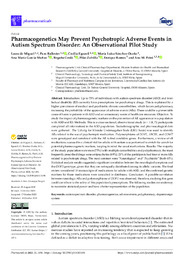Título :
Pharmacogenetics May Prevent Psychotropic Adverse Events in Autism Spectrum Disorder: An Observational Pilot Study |
Autor :
Miguel, Laura de
Ballester, Pura 
Egoavil, Cecilia 
Sánchez-Ocaña, María Luisa
García-Muñoz, Ana María
Cerdá, Begoña
ZAFRILLA, PILAR 
Ramos, Enrique 
Peiró, Ana  |
Editor :
MDPI |
Departamento:
Departamentos de la UMH::Farmacología, Pediatría y Química Orgánica |
Fecha de publicación:
2023-10-20 |
URI :
https://hdl.handle.net/11000/32352 |
Resumen :
Introduction: Up to 73% of individuals with autism spectrum disorder (ASD) and intellectual disability (ID) currently have prescriptions for psychotropic drugs. This is explained by a higher prevalence of medical and psychiatric chronic comorbidities, which favors polypharmacy, increasing the probability of the appearance of adverse events (AEs). These could be a preventable cause of harm to patients with ASD and an unnecessary waste of healthcare resources. Objective: To study the impact of pharmacogenetic markers on the prevention of AE appearance in a population with ASD and ID. Methods: This is a cross-sectional, observational study (n = 118, 72 participants completed all information) in the ASD population. Sociodemographic and pharmacological data were gathered. The Udvalg for Kliniske Undersøgelser Scale (UKU Scale) was used to identify AEs related to the use of psychotropic medication. Polymorphisms of DOP2, ABCB1, and COMT were genotyped and correlated with the AE to find candidate genes. Furthermore, a review of all medications assessed in a clinical trial for adults with autism was performed to enrich the search for potential pharmacogenetic markers, keeping in mind the usual medications. Results: The majority of the study population were men (75%) with multiple comorbidities and polypharmacy, the most frequently prescribed drugs were antipsychotics (69%); 21% of the participants had four or more AEs related to psychotropic drugs. The most common were “Neurological” and” Psychiatric” (both 41%). Statistical analysis results suggested a significant correlation between the neurological symptoms and the DOP2 genotype, given that they are not equally distributed among its allelic variants. The final review considered 19 manuscripts of medications for adults with ASD, and the confirmed genetic markers for those medications were consulted in databases. Conclusion: A possible correlation between neurologic AEs and polymorphisms of DOP2 was observed; therefore, studying this gene could contribute to the safety of this population’s prescriptions. The following studies are underway to maximize statistical power and have a better representation of the population.
|
Palabras clave/Materias:
autismspectrumdisorder
pharmacogenetics
adverse events
polypharmacy
dopaminergic system |
Área de conocimiento :
CDU: Ciencias aplicadas: Medicina: Farmacología. Terapéutica. Toxicología. Radiología |
Tipo de documento :
info:eu-repo/semantics/article |
Derechos de acceso:
info:eu-repo/semantics/openAccess |
DOI :
https://doi.org/10.3390/ph16101496 |
Publicado en:
Pharmaceuticals (Basel). 2023 Oct 20;16(10):1496 |
Aparece en las colecciones:
Artículos - Farmacología, Pediatría y Química Orgánica
|

 La licencia se describe como: Atribución-NonComercial-NoDerivada 4.0 Internacional.
La licencia se describe como: Atribución-NonComercial-NoDerivada 4.0 Internacional.
.png)